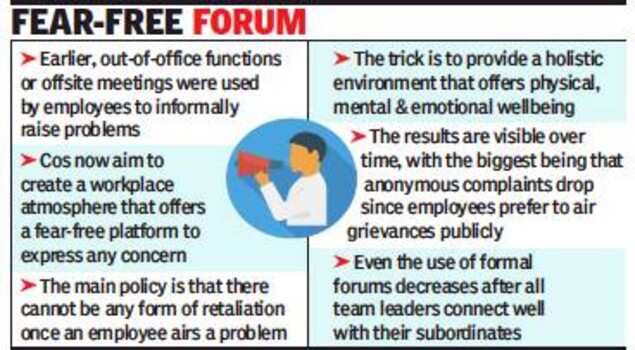
MUMBAI: Employees are becoming more vocal in expressing their concerns at the workplace, but the fear of retaliation is still palpable. What people today seek from their workplace — apart from the usual satisfaction factors — is psychological safety. Most organisations have policies to ensure the physical and mental well-being of their employees. Now some are creating a comfort culture for employees to speak up without the fear of retaliation.
In her previous role as a sales manager at a telecom company, Shachi Irde recalls how sales meetings used to be brutal and scathing for those who had failed to meet their targets. Offsites, however, were a time when employees would get back at their boss. They would take up issues with the boss on how the requisite support was not provided to meet targets and, yet, how they were humiliated during sales meetings.
“Offsite time was used by all — right from the junior most to the senior most employee — to give vent to their feelings. It was a time to get the negativity out of our system. The offsite remained a psychologically safe place for me as I knew I could say what was on my mind without the fear of retaliation. The next day was business as usual,” recalls Irde, who is now the chief consulting partner at Interweave, a diversity and inclusion consulting firm.

Organisations are increasingly talking about how a workplace can be a psychologically safe place for employees to speak up if they feel they have been wronged or if they see bad behaviour at work. Schneider Electric enables psychological safety at the workplace through a combination of interventions for physical, mental, social and emotional well-being.
Schneider Electric India director (rewards) Barun Sen said, “An interesting practice that a lot of us have started doing is a ‘well-being’ check — whether it’s at the start of a meeting, a conference call or even a townhall. It’s simple — we put up a slide with a whole lot of emoticons (sad, angry, curious, bored, happy) and ask our teammates to choose the one with which they identify the most. It creates a culture of starting off on a fun note and for the leader of the meeting/session, it’s also an easy pulse check of your teammates. This, according to us, is a very practical way of ensuring psychological safety.”
On the other hand, an anonymous “red line” mechanism for reporting a violation is managed centrally and is meant to assure people that their grievances will be heard and addressed. “If an employee is not allowed to speak up and voice their concerns, Schneider Electric as an organisation will not be able to learn and move ahead. Similarly, if a team member feels ‘heard’ by her/his team and manager, she/he is better able to innovate, to brainstorm and to offer ideas that will ultimately strengthen the organisation,” said Sen.
Experts, however, argue that a workplace is not entirely psychologically safe if an employee feels the need to hide behind anonymity while raising issues. Professional services firm EY has a programme called ‘Counselling Families’, wherein a leader meets his team once every two months to not only apprise them about the business but also to listen to their queries.
EY India partner and talent leader Sandeep Kohli said, “At Counselling Families, employees are encouraged to speak up on any issue, without the fear of retaliation. Two years since this programme was started, anonymous complaints as a percentage of total has come down.”
The second leg of the policy framework is that EY is conducting inclusive leadership workshops in which leaders are sensitised. Then these leaders, in turn, are trained to sensitise managers and senior managers down the line to build a culture where people can openly come up and raise concerns, if any.
In her previous role as a sales manager at a telecom company, Shachi Irde recalls how sales meetings used to be brutal and scathing for those who had failed to meet their targets. Offsites, however, were a time when employees would get back at their boss. They would take up issues with the boss on how the requisite support was not provided to meet targets and, yet, how they were humiliated during sales meetings.
“Offsite time was used by all — right from the junior most to the senior most employee — to give vent to their feelings. It was a time to get the negativity out of our system. The offsite remained a psychologically safe place for me as I knew I could say what was on my mind without the fear of retaliation. The next day was business as usual,” recalls Irde, who is now the chief consulting partner at Interweave, a diversity and inclusion consulting firm.

Organisations are increasingly talking about how a workplace can be a psychologically safe place for employees to speak up if they feel they have been wronged or if they see bad behaviour at work. Schneider Electric enables psychological safety at the workplace through a combination of interventions for physical, mental, social and emotional well-being.
Schneider Electric India director (rewards) Barun Sen said, “An interesting practice that a lot of us have started doing is a ‘well-being’ check — whether it’s at the start of a meeting, a conference call or even a townhall. It’s simple — we put up a slide with a whole lot of emoticons (sad, angry, curious, bored, happy) and ask our teammates to choose the one with which they identify the most. It creates a culture of starting off on a fun note and for the leader of the meeting/session, it’s also an easy pulse check of your teammates. This, according to us, is a very practical way of ensuring psychological safety.”
On the other hand, an anonymous “red line” mechanism for reporting a violation is managed centrally and is meant to assure people that their grievances will be heard and addressed. “If an employee is not allowed to speak up and voice their concerns, Schneider Electric as an organisation will not be able to learn and move ahead. Similarly, if a team member feels ‘heard’ by her/his team and manager, she/he is better able to innovate, to brainstorm and to offer ideas that will ultimately strengthen the organisation,” said Sen.
Experts, however, argue that a workplace is not entirely psychologically safe if an employee feels the need to hide behind anonymity while raising issues. Professional services firm EY has a programme called ‘Counselling Families’, wherein a leader meets his team once every two months to not only apprise them about the business but also to listen to their queries.
EY India partner and talent leader Sandeep Kohli said, “At Counselling Families, employees are encouraged to speak up on any issue, without the fear of retaliation. Two years since this programme was started, anonymous complaints as a percentage of total has come down.”
The second leg of the policy framework is that EY is conducting inclusive leadership workshops in which leaders are sensitised. Then these leaders, in turn, are trained to sensitise managers and senior managers down the line to build a culture where people can openly come up and raise concerns, if any.
Download The Times of India News App for Latest Business News.
more from times of india business
Business News
LATEST VIDEOS
More from TOI
Navbharat Times
Featured Today in Travel
Quick Links
ELSS Mutual Funds BenefitsIncome Tax Refund statusWhat is AssochamITR Filing Last DateHome Loan EMI TipsHome Loan Repayment TipsPradhan Mantri Awas YojanaTop UP Loan FeaturesIncrease Home Loan EligibilityHome Loan on PFTax Saving Fixed DepositLink Aadhaar with ITRAtal Pension YojanaNita AmbaniIndian EconomyRBIAadhaar CardSBIReliance CommunicationsMukesh AmbaniIndian Bank Ifsc codeIDBI Ifsc codeIndusind ifsc codeYes Bank Ifsc CodeVijay Bank Ifsc codeSyndicate bank Ifsc CodePNB Ifsc codeOBC Ifsc codeKarur vysya bank ifscIOB Ifsc codeICICI Ifsc codeHDFC Bank ifsc codeCanara Bank Ifsc codeBank of baroda ifscBank of America IFSC CodeBOM IFSC CodeAndhra Bank IFSC CodeAxis Bank Ifsc CodeSBI IFSC CodeGST
Get the app







